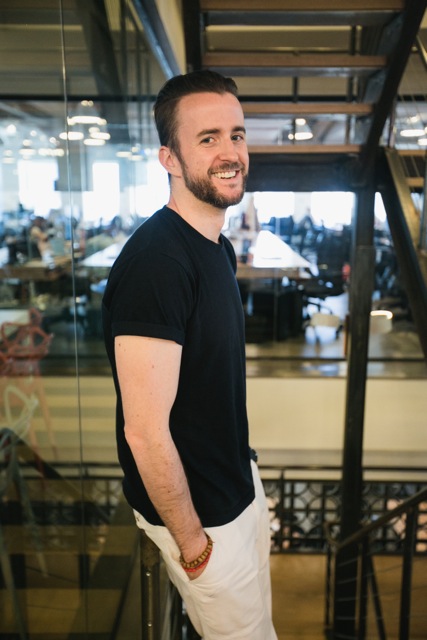Turn Passion Into Business
Wise musician John Legend advised University of Pennsylvania’s 2014 graduating class, “The key to success, the key to happiness, is opening your mind and your heart to love – spending your time doing things you love and with people you love,” a philosophy one would expect from the artist behind ballads like “Ordinary People” and “All of You.” But entrepreneurs like Casey Gibbons, the co-founder of Maki Fund, has a similar outlook on finding love in all facets of life.
What Is Passion In Business
“John Legend’s commencement speech at Penn says it all,” Casey tells us. “You have to choose love in everything that you do.”
Inspired by passionate entrepreneurs and fueled by iced coffee, Casey co-founded Maki Fund along with tech genius Matt Jones in order to help build startups. “I like to think we have a recipe for building the first piece of software that startups need,” Casey says. So whether this be a website, a mobile app or just about anything else, Maki Fund can create and easily predict a new product’s level success in the market.
Identifying the company as a more transparent version of an outsourced dev shop, Casey and Matt’s recipe includes two key ingredients: great engineers and a good sense for launching a startup into the market. For the Maki team, this process takes the form of either building someone else’s idea from scratch or building their own startups internally, such as their wedding template site Riley & Grey.
As a premium service in its space, Riley & Grey provides both beautiful designs and a really great user experience, an idea that stemmed from friends’ complaints about existing websites in the wedding market. After receiving really positive feedback from their first users, the team decided to build the platform into its own company entirely, with Casey’s wife Marissa Wilson Gibbons as the CEO.
With plenty of firsthand startup expertise, Casey finds satisfaction in helping other people get their businesses off the ground. He built his first company during his senior year at Williams College, a small liberal arts school that didn’t exactly help Casey decide what he wanted to do with his life.
“During my senior year, my friends were all taking jobs in banking and consulting, but that just didn’t feel right,” he says. “I caught the startup bug. I was fascinated by the stories of Facebook and YouTube, as well as the people behind them.”
Recognizing that young, creative people don’t need law degrees to start something disruptive, Casey began doing hack designs for products before starting his first company, nextplay.com.
As a member of the Williams basketball team, Casey recognized firsthand the need for a web alternative to the stacks of game films that lived in his coaches office. “I initially sold coaches on a service that didn’t exist and got really lucky,” he says. Eventually he connected with an angel investor, who provided him with the resources he needed to work on the project for two and a half years.
Unfortunately, with the 2008 collapse of the market, nextplay.com’s funding fell through, and the company went under. Energized by his entrepreneurial experience and eagerness to learn more, Casey decided to formalize his startup education by taking a job at Commonwealth Capital Ventures, a Boston-based VC firm.
Shortly thereafter, Casey founded his second company (an online dating app not unlike today’s Hinge and Tinder apps) called Acquaintable, which Casey jokes, “was a bad name because it’s really hard to spell.”
Casey ultimately decided to move to New York to build the company and he brought Matt Jones on board to handle the site’s development. Casey says of his now business partner, “The best thing that came out of working on Acquaintable was working with Matt. He’s easily the most brilliant engineer I’ve ever worked with.”
Because they enjoyed working together, Casey and Matt started building their own small development firm with engineer Aaron Vasquez, a project that has since grown into Maki Fund. But even after successfully building a site for their first client, a members-only social network called IvyConnect, Casey was still not certain about Maki’s future.
“I thought we were just buying time before our next startup,” he says. “But we eventually realized we had a sustainable model and that we liked building startups for other people.”
Now having built companies like IvyConnect, TimeShel, and Riley & Grey, Casey admits that he still has a lot to learn about building his own team. He is, however, certain of two important things when it comes to choosing your teammates.
“I don’t want to work with people who all have the same personality,” he says. “People need to complement each other and have a common goal, but diversity is key.”
Secondly, Casey recognizes the value of working alongside people with passion. “I try to make my team’s jobs more compelling by giving them the opportunity to work on really interesting projects. But people really have to love what they do. Those people tend to be much happier and work much harder.”
Casey builds off of this idea further, arguing for the importance of finding fulfillment in one’s work, a feeling that gets him excited to head to work every day.
“People often take career paths or associate with people they don’t necessarily love,” Casey explains. “But if you trust your instinct and do something that you love, you’ll always end up in the right place.”
Photographs by Lauren Kallen





